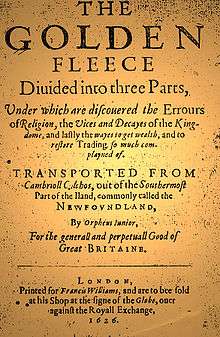William Vaughan (writer)
Sir William Vaughan (1575 – August 1641) was a Welsh writer and colonial investor.
Life
He was the son of Walter Vaughan (died 1598) and was born at Golden Grove, Carmarthenshire, Wales—his father's estate. He was descended from an ancient prince of Powys. He was brother to John Vaughan, 1st Earl of Carbery (1572−1634) and Henry Vaughan (1587−1659), a well-known Royalist leader in the English Civil War. William was educated at Jesus College, Oxford, where he matriculated on 4 February 1592, and graduated B.A. on 1 March 1595, M.A. on 16 November 1597. He supplicated for the law degree of B.C.L. on 3 December 1600, but before taking its he went abroad, travelled in France and Italy, and visited Vienna, where he proceeded LL.D., being incorporated at Oxford on 23 June 1605.[1]
In 1616 he bought a grant of land, the southern Avalon Peninsula (from Calvert to Placentia Bay) of the island of Newfoundland, from the London and Bristol Company. In 1617 he sent Welsh colonists to Renews to establish a permanent colony, which he called Cambriol; it eventually failed. The colonists were ill equipped, without an experienced leader, and had built for themselves mere shacks for shelter for the winter. In 1618 Vaughan sent out a second batch of settlers under the command of Richard Whitbourne, whom he appointed governor for life of the undertaking.[1]
By 1619 Vaughan signed over part of his grant to Henry Cary. Vaughan’s brother had convinced him to also to give up a portion of his tract to George Calvert, the area around Ferryland. This area George Calvert had established his Colony of Avalon. Vaughan retained the southern portion of his tract determined by a line drawn from Renews to Placentia Bay, an area that included Trepassey. Further attempts at colonizing Trepassey on two occasions had also failed. After the return of Whitbourne, Vaughan visited his colony in 1622, and returned to England in 1625, bringing with him two works ready for publication.[1]
Vaughan apparently paid another visit to Cambriol, but his plans for its prosperity were foiled by the severe winters. In 1628 he transferred his interests to the colony of Virginia. He died at his house of Torcoed, Carmarthenshire, in August 1641.
Works
His chief work is The Golden Grove (1600), a general guide to morals, politics and literature, in which the manners of the time are severely criticized, plays being denounced as folly and wickedness. The section in praise of poetry borrows much from earlier writers on the subject.

The Golden Fleece … transported from Cambriol Colchis, by Orpheus junior (1626) is the most interesting of his other works. A long and fantastic prose allegory, it demonstrates "the Errours of Religion, the Vices and Decayes of the Kingdome, and lastly the wayes to get wealth, and to restore Trading" through the colonization of Newfoundland.
References
- Attribution
 This article incorporates text from a publication now in the public domain: Chisholm, Hugh, ed. (1911). Encyclopædia Britannica (11th ed.). Cambridge University Press.
This article incorporates text from a publication now in the public domain: Chisholm, Hugh, ed. (1911). Encyclopædia Britannica (11th ed.). Cambridge University Press. This article incorporates text from a publication now in the public domain: "Vaughan, William (1577-1641)". Dictionary of National Biography. London: Smith, Elder & Co. 1885–1900.
This article incorporates text from a publication now in the public domain: "Vaughan, William (1577-1641)". Dictionary of National Biography. London: Smith, Elder & Co. 1885–1900.
External links
|